Crapshoot: FMV 'classics' The 7th Guest and 11th Hour
We're rerunning Richard Cobbett's classic Crapshoot column, in which he rolled the dice and took a chance on obscure games—both good and bad.
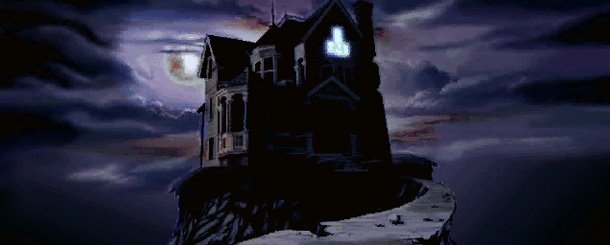
From 2010 to 2014 Richard Cobbett wrote Crapshoot, a column about rolling the dice to bring random obscure games back into the light. This week, I can't take a breath without seeing Mr. Death. But I can't see Mr. Death... if I don't take that breath... (taps toes against floor)
Time is rarely kind to technology showpieces. As hard as it might be to imagine now, The 7th Guest was one of the games that proved the PC still had some life in it back in 1993. Most games came on floppy disks at the time, their CD versions treated as a premium edition—full speech 'talkies' being the most common incentive to upgrade. The 7th Guest was one of the first mainstream hits that demanded the extra space, and it showed off every major technology other than real-time 3D. Rendered backgrounds! FMV cut-scenes! CD quality audio! A roughly £70 price tag, if I remember correctly! It was one of the most ambitious PC games ever, and players couldn't wait to be sucked into its dark world.
This is proof that all the technology in the world can't make 'MWAH HA HA! I challenge you... to cut this cake fairly!' seem scary. Unless you're allergic to nuts and worried it might contain some.
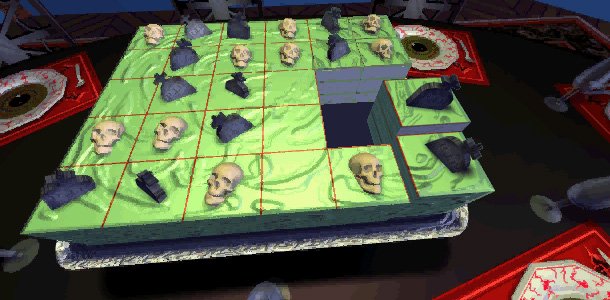
It's easy to mock The 7th Guest series, and I plan to. Still, I have a certain fondness for the first game. It offered incredible atmosphere for its time, along with a luscious, creepy setting to explore and poke around in and dream of a time when good adventures would look like this too. That carried it pretty far, and is still worthy of note. Don't invest in a new pair of rose-tinted glasses though, because even at the time this technical proficiency was marred by an appalling story, unimaginative puzzles and a cast whose dialogue is hard to hear, even before everyone starts filling their mouths with tasty scenery. It's not the worst FMV ever, but it's still worse than a ham sandwich with herpes.
Despite that, the sequel—The 11th Hour—actually lowered the tone. In both cases, the best way to figure out just what the hell is going on is simply to read the original screenplays that come free with the new Good Old Games versions. Just don't expect to be able to take the results seriously. The one thing the games have in their favour is that they're so badly told, they may convince you that you're simply missing the point. You're not. These things make Phantasmagoria look like The Exorcist.
The story kicks off decades ago. A drifter named named Stauf is robbing his way through life, until one night he murders a girl on the way home from choir and steals her purse. For some reason, this results in him getting a vision of a beautiful doll, which he duly carves and sells to a nearby innkeeper—and the next night, he receives a vision of a puzzle. Soon enough, Stauf becomes a rich and powerful toymaker whose success comes with only one minor catch: the kids who own his product start dying of a mysterious illness and losing their souls to their toys in ways the world wouldn't see again until Tamagotchi. Stauf, unconcerned, keeps selling his toys, until finally he gets his biggest vision of all—a scary mansion on the edge of a town called Harley on Hudson (coincidentally, also the name of a bit of Batman/Gargoyles erotic fan-fiction I'm writing), where he invites six guests to come play games of murder and perversion and... uh... sliding block thingies. But evil ones. Obviously.
At least, that's the idea. In practice, it turns out that while the devil may have the best tunes, his games are largely restricted to board game puzzles, mazes, and other stuff cribbed straight from 101 Puzzles for the Damned and Abjured. This never deters Stauf, who acts as a constant mocking presence in both games and really, really wants to chill your blood with every fiendish new puzzle, but even the best demon would struggle to make the evil laughter hit home when the only thing that's going to happen is a few chess knights rising up from the ground with an "oh, just indulge him" shrug.
Keep up to date with the most important stories and the best deals, as picked by the PC Gamer team.
Sometimes, it's just plain sad. The worst moment in the first game is in the kitchen, where you stumble upon line after line of soup cans. You know how anything can be scary in the right context? Not here. The puzzle is to make a sentence with no vowels except for the letter 'y', which is fine in theory. The solution though, SHY GYPSY SLYLY SPRYLY TRYST BY MY CRYPT, smacks of a damned soul trying too damn hard to be clever. No wonder he needed cursed dreams to make his toys.
(I like to imagine the devil dropping by before the game begins, looking around his new base of operations in the mortal world and saying, "Love what you've done with the skeleton in the bathtub, Staufy-boy, but remind me how making your six visitors painstakingly decode the message THE SKY IS RUDDY YOUR FATE IS BLOODY will help usher their souls into my dark kingdom?")
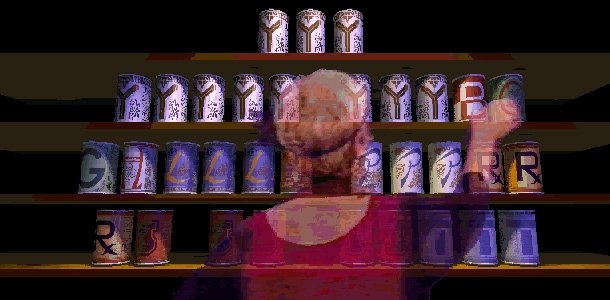
Despite its problems, The 7th Guest gets away with most of this stuff. Its story is poorly told and makes little sense, but it has a slow, ponderous sense of mystery on its side. Exploring, it's clear that bad, bad things went on in this house, and not all of them involved acting. Rooms give ghostly glimpses of the last six guests invited to Stauf's mansion on one fateful evening, and the Faustian deals they all hoped to strike. Whether they wanted money or youth or power, Stauf promised he could deliver—if they first delivered him the titular seventh guest... an innocent young boy called Tad, trapped in the house after being dared to sneak in. There's not a lot more to it than that, but there didn't have to be. Stauf gets a few genuinely chilling moments, and while the experience is slower than molasses (oh, how you long for a 'skip animation' button), it's unique enough to punch through its problems.
In short, as a one-time deal, it holds up OK even today. Not great. But OK.
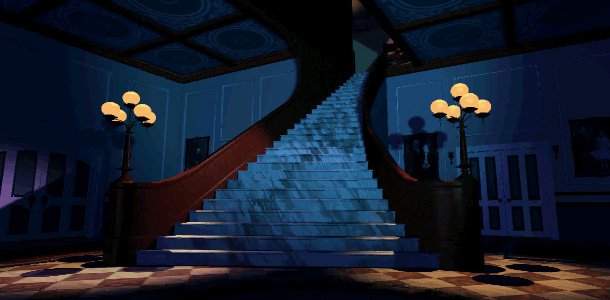
The 11th Hour on the other hand is just dreadful. It's set decades later, with the house crumbling and decaying and filled with new puzzles, but still ultimately the same location. Horror and familiarity don't typically go hand-in-hand, and this is a good demonstration of why. Developers Trilobyte tried to compensate by adding new elements to freshen it up, and every single one is a miserable failure. Cryptic scavenger hunts, for instance. Shudder. Just say no.
They also opted to follow up on a much-hated puzzle from the first game—a Reversi game played against the AI—with several more outright games against Stauf to break up the puzzles. Sounds like a good idea? Sure, if you didn't suck at them. However, even the basic concept was weighed down by one big problem. The Reversi puzzle's difficulty scaled up with your computer's power. Not long after the game came out, it became literally impossible. Adding more puzzles like that, even working properly, was expecting people to cheer at the thought of being kicked up the arse with a steel-capped boot every few puzzles they solved.
(In fairness, you can skip puzzles in both games, so it's hard to get stuck, though The 7th Guest pretended that doing so would have consequences, making most players reluctant to risk it.)
The worst bit though is the ham-fisted story, which moves on from being a poorly told but atmospheric ghost story to full on B-movie schlock. You now play an incredibly unlikeable TV reporter called Carl, searching for his producer/lover Robin in the abandoned mansion. A smart person would do this by kicking the doors down and yelling "ROBIN!?" at the top of his voice. Instead, he's happy to arse about reordering books, playing with chess pieces, and putting up with the voice of Stauf in his head constantly call him an idiot for not guessing that "Winter coat worn for a mixer" translates as 'tonic water'.
This is what happens when the minions of evil get too much downtime between sequels.
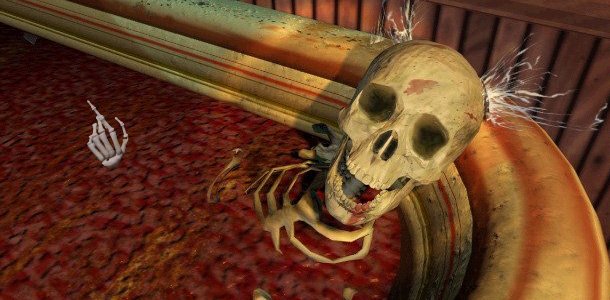
As for Stauf's actual rebirth... ugh. In the first game, he actually has some menace to him at points. He's nasty. He's manipulative. He's mysterious. In the gap between that game and The 11th Hour though, he's apparently had nothing better to do with his time than watch the later Nightmare on Elm Street movies, and decide to devote himself to being a complete arse. "A lot of intermarriage in your family, stupid?" he mocks you one minute. "If you want to make a call, hang yourself and try again..."
"Don't you have some soup cans you could be playing with?" is the only sane response.
Most of the story is badly told, and not helped by the fact that Trilobyte couldn't decide if they wanted to tell a mature, adult story, or tone it down to PG level. The original plans included sex and nudity, while the final version waters down everything except the stupidity. Most of the cutscenes show the story so far, chopped up into not particularly interesting chunks, and few covering any ground of importance to a guy trapped in a world of scary sliding block puzzles. Any sense of power in Stauf's talk of his evil house having the power to grant wishes is somewhat undercut by the fact that it can't even keep itself clean, any tension constantly dissipated by his puns and attempts to sound clever.
By far the worst moment though? That would be the ending. Carl corners Stauf in the attic, and the whole final confrontation is played out as a cheap gameshow parody called "Let's Make A Right Deal". It's... it's... oh, just watch the thing.
Two of those endings are simply bad. Bad, bad, bad. The third one though—the 'Schmuck Bait' ending, if you will—is arguably one of the worst things ever acted out in front of a blue screen. How do you forever destroy your villain's credibility? You make this his ultimate moment of victory.
The 11th Hour largely fails because the story and the game live in two different worlds. Puzzles can tell stories. They can be based on dark concepts. They can even advance the plot, by recreating the events of the past in a different form. The 11th Hour prefers to just wheel out random crap to stick between the unrelated FMV sequences, even when it makes absolutely no sense for Stauf to dick around.
The result is a game that's completely unsatisfying to play, and without the technical innovation of the first game, it's not surprising that it stumbled at the market. Trilobyte had another go at the style in an animated 7th Guest clone called Clandestiny, before bottoming out with one of the most infamous flops in gaming history. It was called Uncle Henry's Playhouse, and was made up of a few puzzles from the three games stuck together and sold as a compilation. Fans had already played them. Nobody else cared. At release, it's said to have sold just 178 copies. Worldwide. The word is 'ouch'.
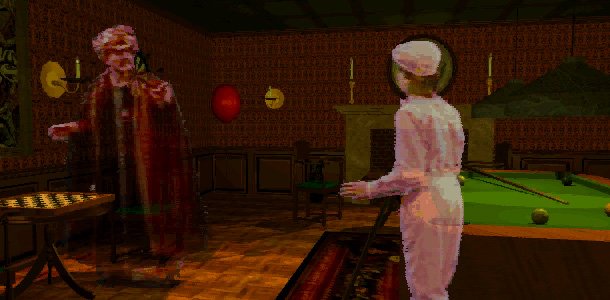
After that, the series floundered. There were plans and a teaser trailer for a third game in the series, The Collector, in which Stauf would have been a museum curator, but that never came to anything. There's a continuation though, the apparently authorised fan-sequel The 13th Doll.
But what if it's all academic? What if Stauf's evil was so powerful, it transcended the bonds of fiction itself to unleash itself on the world we know and at least tolerate? Obviously, I'm not saying that's actually happened. No. No, that would take some seriously compelling evidence...


Made players murder many children.
Built a castle that scared people.
To repeat, I'm totally not saying that Lord British definitely is the tool of sin's legions. I'm just saying it would explain why Tabula Rasa's slogan was "Subscribe And Be Spared The Wrath Of My Master".
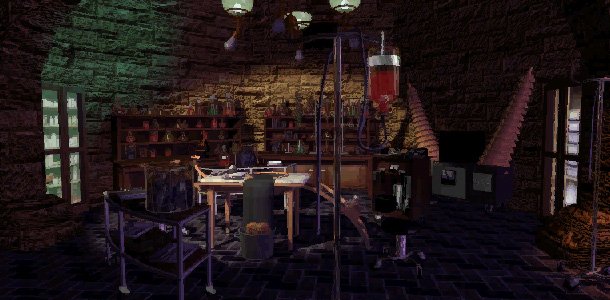
Arguably the best thing about the 7th Guest/11th Hour games were their soundtracks. The music was put together by well-known composer The Fat Man, and is one of the most eclectic collections of music ever put to a game. The main theme is The Game, which also acts as a general leitmotif throughout the series, though for some reason the inane Skeletons In My Closet was given the honour of playing over the ending credits. The 11th Hour then really cranked up the weirdness with The Final Hour (whose lyrics "I should be doing Stuff. But I'd rather put it Off. Until the Final Hour..." are something of a personal philosophy), and the unforgettable main menu theme Mr. Death. That's all aside from the pure instrumental tracks, all very different, but most of them catchy even out of context.
The main tunes were compiled into a dedicated soundtrack disc called 7-11, and are well worth a listen. As for The 7th Guest itself? It's interesting if you've never played it, and a quick slice of nostalgia if you have, though don't expect to be convinced by its aching slowness and pretensions of being more than series of stock puzzles. The obvious test? Read this, and see if it sends a chill down your spine.
Old man Stauf built a house, and filled it with his toys
Six guests were invited one night, their screams the only noise
Blood inside the library, blood right up the hall
Dripping down the attic stairs...
Hey guests, try not to fall!
Nobody came out that night, not one was ever seen
But old man Stauf is waiting there, crazy, sick, and mean!
No? It's not that much scarier when spoken.

